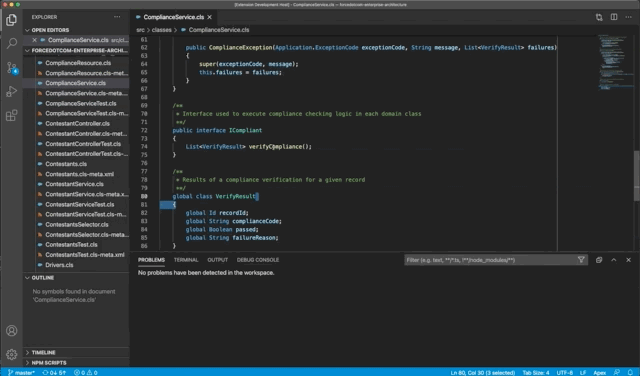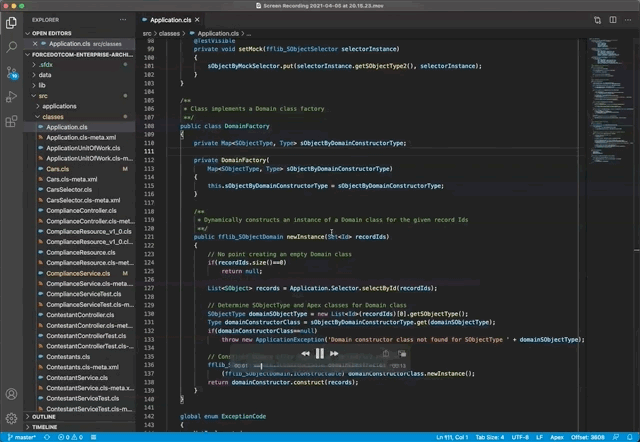Apex Assist provides instant validation of Apex source code without the need to wait for files to be deployed to an org. You can use it in addition to the Salesforce Apex extension or as an alternative. The local validation makes refactoring code much easier and quicker than waiting for a deployment to an org to fail, you get continual feedback on problems across the whole code base as you are making changes.
In the latest version we have added support for downloading metadata from an org so it can support org driven development models. The same download feature can also be used when developing code that depends on managed packages.
Here is an example of using it to rename a method and finding uses of that method that need to be updated.
The extension also includes a class dependency explorer which you can use to visualize your code base.
There are two levels of validation:
- As you type checking occurs for syntax errors and basic semantics errors
- When you Save checking occurs for full syntax and semantic errors, additional validation occurs to see if other files may now have errors due to the changes made.
For example, a badly used modifier can be detected as you type, but passing the wrong arguments to a method would only be detected after saving the file.
The extension also supports semantically aware code completion and 'goto defintion' for Apex code. It does not yet support 'find references' but we are planning to add that soon.
We have tried whenever possible to minimise both memory and cpu use in the extension. This means it is particular useful as an alternative to the Salesforce Apex extension on larger projects.
The extension activates on any workspace which contains a sfdx-project.json file. It reads the packageDirectory entries to locate Salesforce metadata and honours forceignore entries. It will read both SFDX (source format) or MDAPI metadata so you can use a fake sfdx-project.json/.forceignore files with MDAPI projects if needed.
When your project loads, you are likely to see some warnings. You can disable the display of warnings in the VSCode settings for 'Apex Assist', so these are not shown by default.
The extension requires that you have a Java 8 or above installed and that the 'java' command line executable is available.
For more information on project setup see ApexAssist Project Setup.
To speed workspace loading in VSCode the extension uses a cache that is by default created in $HOME/.apexlink_cache. The first time you use the extension on a workspace it will take a little longer to start-up, typically up to 30 seconds dependning on size. Subsequent workspace loading will be significantly quicker, a few seconds typically.
When you first open a project it may show errors relating to metadata components that are not within your project but you know will be available on the org(s) you will deploy this code to. To resolve this you can download metadata using the command palette command 'Assist: Download metadata from org' which will prompt you for what metadata to download.
If you are doing org driven development (i.e. not using package namespaces) then you should download the metadata for 'unmanaged'. If you are wanting to develop against packages you should also include the namespaces of those packages. The download process will then start and once complete the errors in the project will be resolved automatically.
If you want to check what was downloaded look into the '.apexlink' folder of your workspace. As part of the download process your sfdx-project.json file will be updated to record the namespaces that are being used. You can undo this either by reverting these changes or re-running the command and specifying no namespaces to download.
-
How are namespaces handled? For sfdx projects the namespace is read from sfdx-project.json if available, otherwise it is assumed that the package metadata can be deployed 'unmanged' without an explicit namespace.
-
I get an error for feature/field Y implemented in API XX, why? The analysis library contains a description of the platform types and SObjects that it checks against. These could either be a little out of date or I may have missed something. Create an issue at ApexAssist.
-
Where is the cache held? It's located in your home directory in '.apexlink_cache'. Each time the cache is used items older than 7 days will be removed but you can clear it at anytime by simply removing it. You can also set the environment variable APEXLINK_CACHE_DIR to provide a custom location.
-
What types of errors can it detect? The code analysis at the moment centers around making sure all identifiers in your code can be located, these are things like Class names/fields, local variables, methods, custom objects and their fields etc. If an identifier can not be located you will always get an error. Parts of Apex that contribute to this goal are fully implemented but there are other validations which have yet to be implemented which we are working on adding.
-
The extension is not working, how do I find out what is happening? Open the VSCode Output window (View->Output) and select 'Apex-Assist' from the drop down. Here you will see debug output from the extension. if you need assistance create an issue at ApexAssist and include the output window contents.

